
More than 180 Seventh-day Adventist communicators, media producers, and special guests met in Miami, Florida, United States, November 7-8, for the Inter-American Division’s (IAD) 2023 Communication Summit (CommSummit).
This was the second gathering of its kind; the first was held 11 years ago, IAD communication director Abel Márquez said. “CommSummit is meant to be a meeting space for professional relationships and the exchange of ideas and experiences to promote innovation, collaboration, and creativity within the church,” he said.
In a recorded video message, IAD president Elie Henry said he was happy to know that Adventist communication professionals have many creative and innovative ideas to share with each other. This event “has the objective of implementing more collaboration in the church,” Henry said. “In this final time we are living in, we have the commission to strengthen the mission that the Lord has entrusted to us.”
The event emphasized mission and the spiritual importance of the service Adventist communicators provide, even when their talents and contributions are not always appreciated. “In a local church, communication is usually the only department that has no budget,” guest speaker Arnaldo Cruz said. “For some churches, communication is about one of the brethren who goes to the podium to announce the activities of the church. But during COVID, the only department that had no budget became key to save the [functioning of] the church,” he said.
Cruz acknowledged that some members are hoping local churches can go back to pre-COVID, pre-Zoom years. “But that church will never be back,” he said. “So, the question is, how can we, as communication directors, make a difference by using social networks?”
Quoting Jesus’ mandate to “go and preach to the whole world,” Cruz suggested focusing on being where people are on social networks. “Social networks need to become a place of salvation,” he said. “Let’s focus as a church to learn about the new technologies, including AI, to use it to share the gospel.”
Cruz emphasized that the communication summit would not just focus on technical aspects or how to become a blessing. “It’s all about preaching the gospel to the whole world, and then the end will come,” he said. “God has chosen us as leaders, as communication directors, as influencers, as YouTubers, so we can tell the world that there’s something better called ‘the God of salvation.’ May all our content be full of only the Spirit of God.”
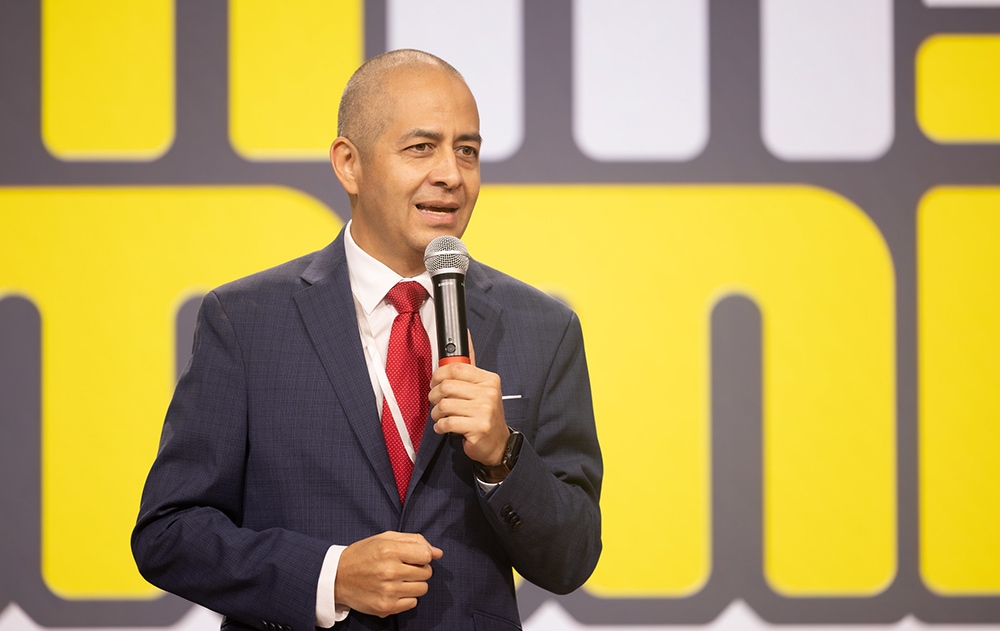
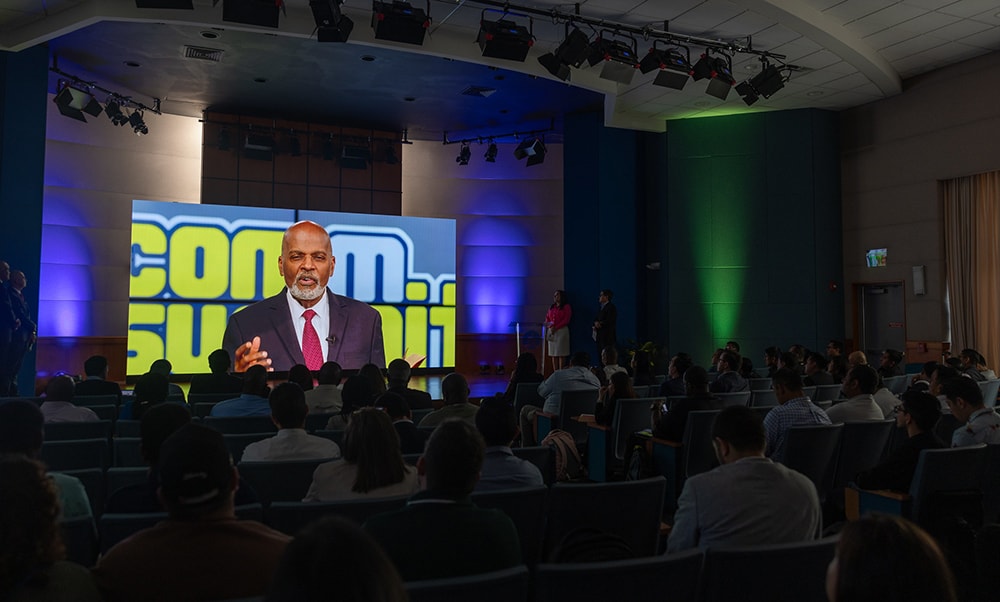

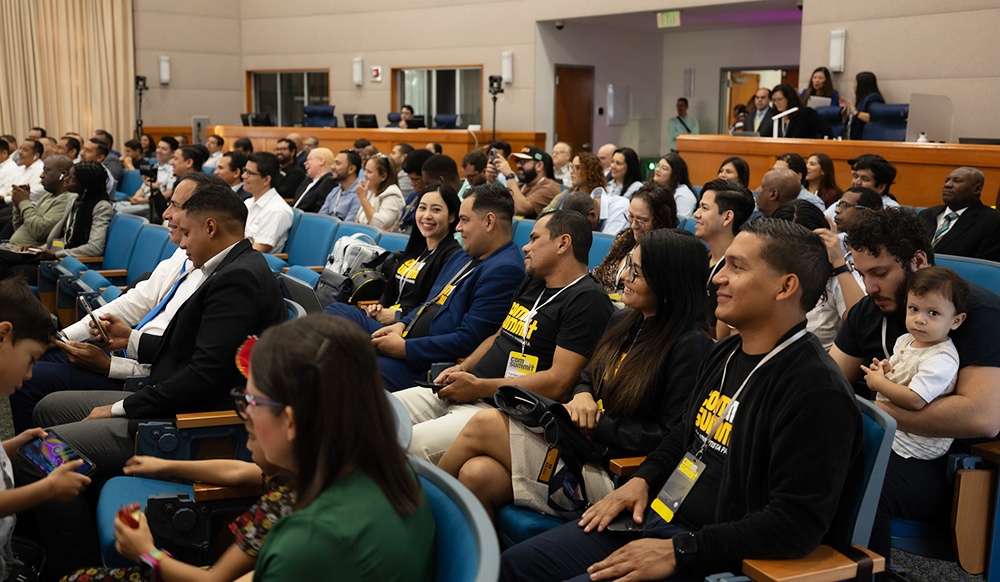
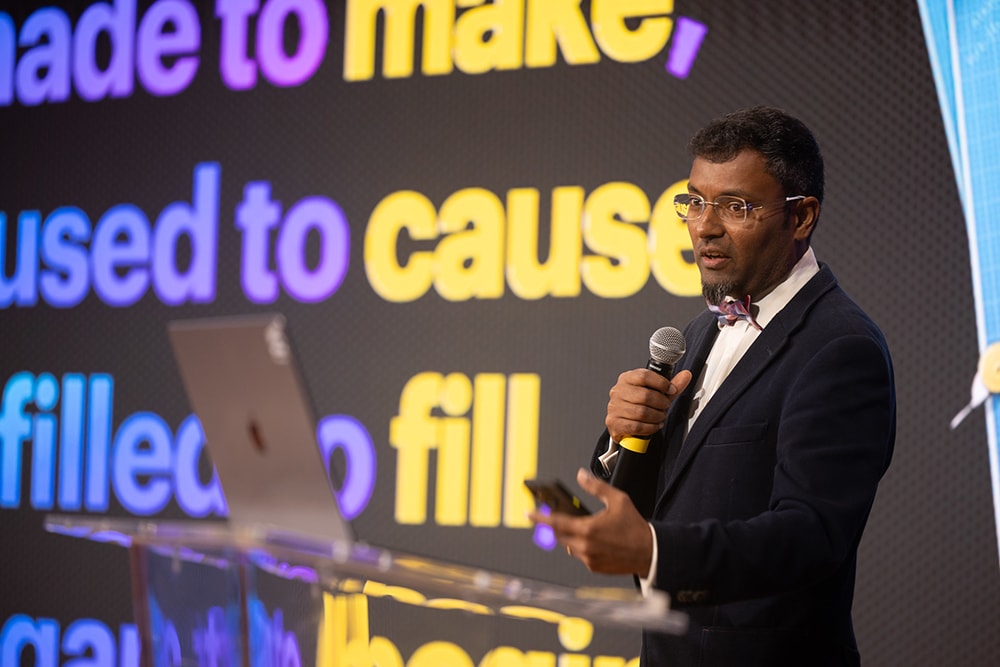
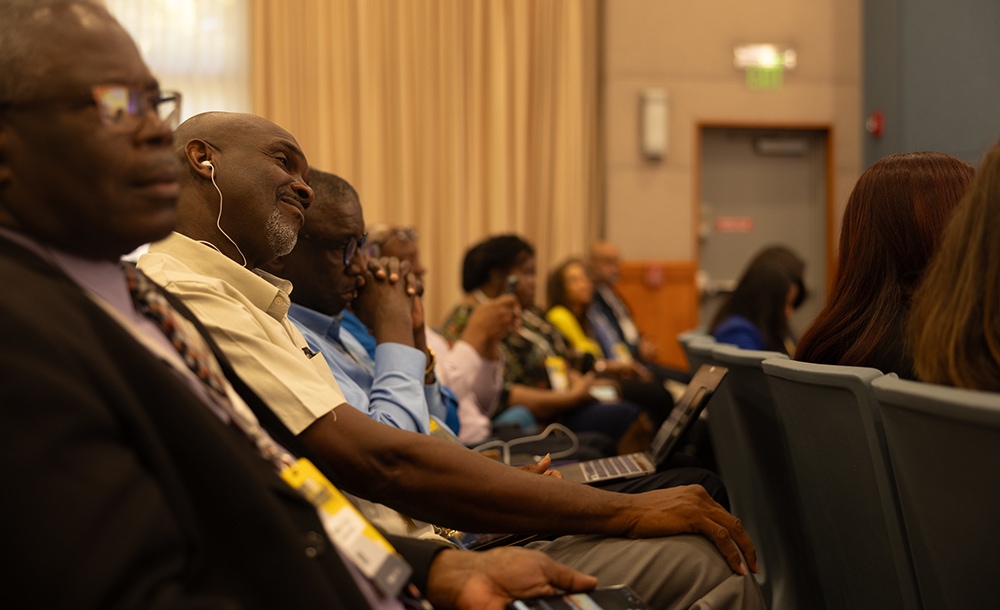
God-based Innovation
Daryl Gungadoo, director of Adventist Review Media Lab, discussed some of the latest technological advancements and the challenges and opportunities for communicators.
“As I read my Bible, I find something very interesting and captivating: In that metanarrative of God creating us, I find that God is constantly seeking to innovate, create, and invent,” Gungadoo said. Despite that, he explained, from a mere business perspective, the story of creation is a failed business model, because it produced a product that became faulty. And in business, you just abandon something that doesn’t work or doesn’t make money and move to something else. Nevertheless, Gungadoo said, “the Bible tells us that God fell in love with His faulty creation.”
Against that background, God allowed for human beings to develop innovation and communication in ways we find hard to maintain. “The Seventh-day Adventist Church was at the forefront of using the printing press, and then included radio. Then it took more time to incorporate television, but we eventually got there. Now it needs to consider how to incorporate the newest technologies for mission,” he said.
To achieve this, Gungadoo suggested that Adventist communicators need to be aware of the abilities of the younger generation. “We must recognize that we ought not to be the only media producers,” he said. “We might need to trust our youth; we might need to trust their perspective on how to repurpose this everlasting message.”
Addressing administrators directly, Gungadoo asked, “How are you as administrators going to create new roads to let the younger generation drive on and trust [it]? What we can do best is building better roads for the next generation instead of trying to monopolize that road… Let [young people] drive on that road that you’re creating for them.”
Imagination and the Church
General Conference (GC) communication director Williams Costa Jr. discussed the role of imagination in the mission of the church. “The sanctuary of the soul is imagination,” he said. “Everything starts when you imagine. And imagination is indispensable for the mission of the church.”
In that sense, Costa emphasized, “technology helps imagination, but technology is not imagination. Imagination is what God inspires us to do.”
Regarding communication in the Adventist Church, Costa explained that when he became communication director in 2010, he could not have anticipated some of the big strides the denomination has made in this area. “Before, our website was all about corporative communication, about our institutions,” he explained. “Now, it’s a website that invites people to find freedom, healing, and hope in Jesus. That’s its purpose.” Basing his reflection on Jeremiah 29:11, Costa emphasized that God has wonderful plans to inspire and prosper the work of communication.
As an example, Costa showed how the GC Communication Department is incorporating AI to share a weekly message by GC president Ted N. C. Wilson in many languages, using Wilson’s own voice. “The point is, we cannot be scared about new technologies,” Costa said. “We need to embrace it and use it for the glory of God. We need to use our imagination to share the good news of salvation to all the world. That’s our purpose.”
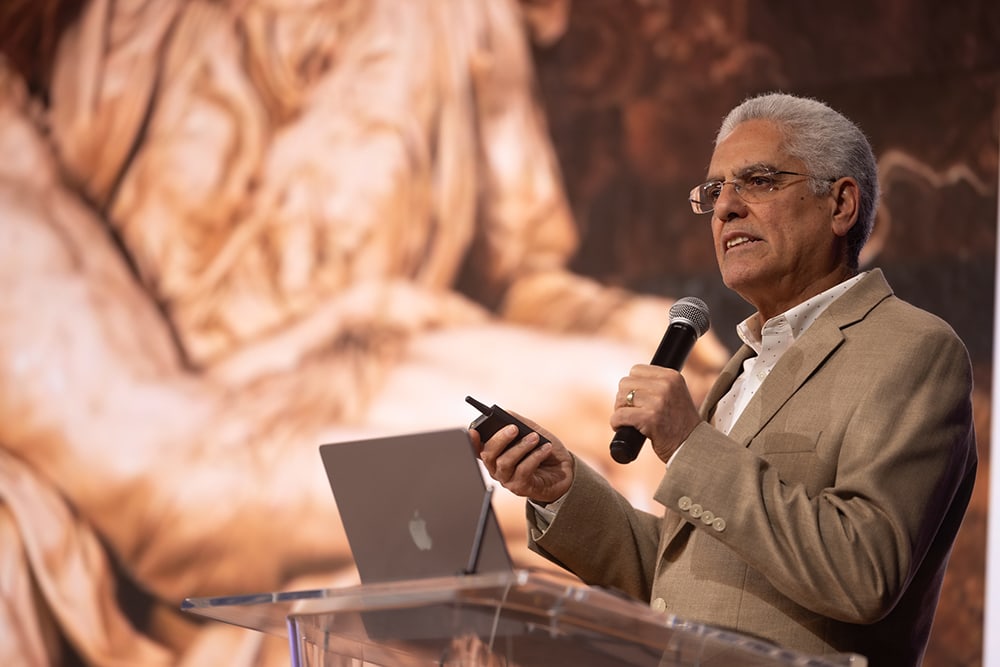
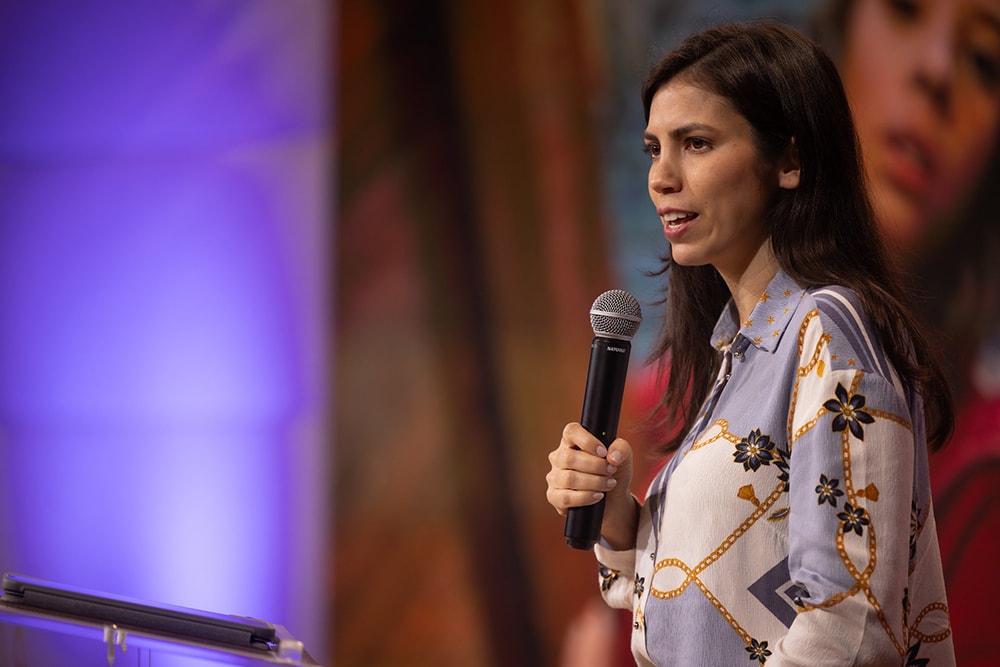
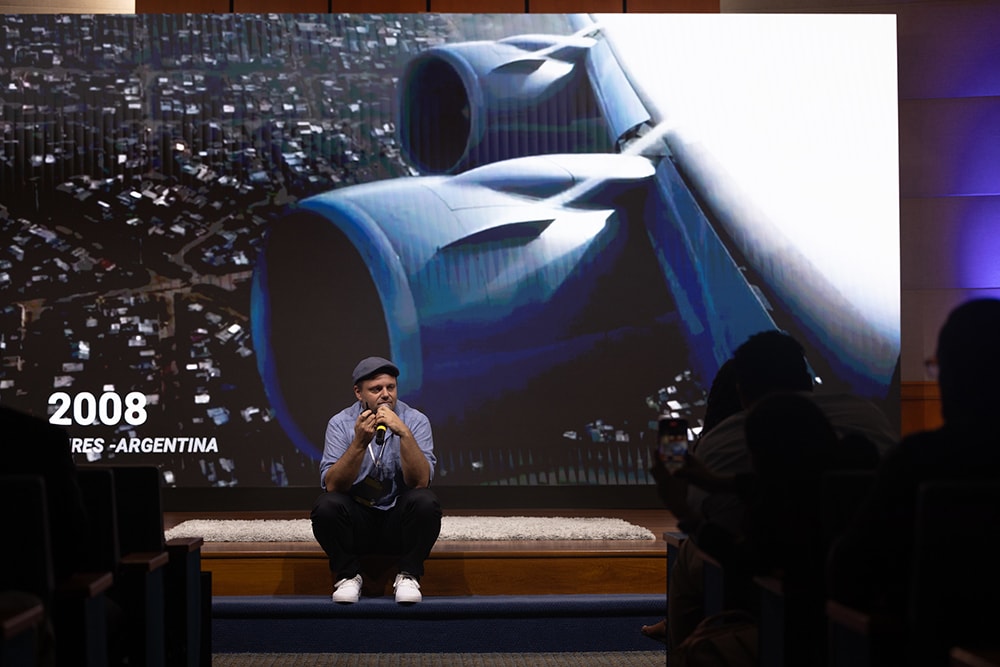
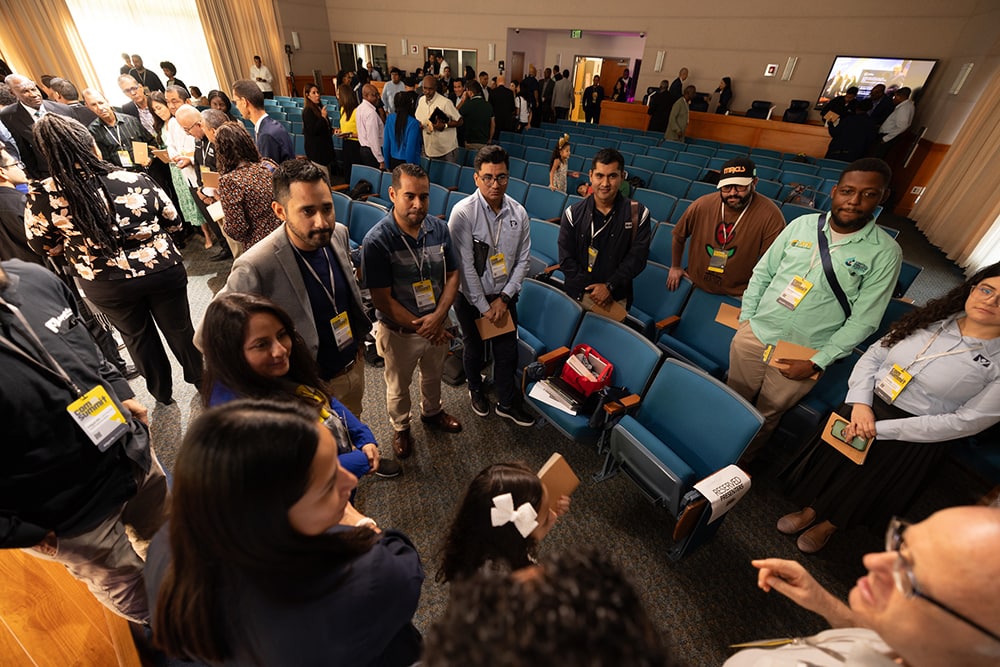

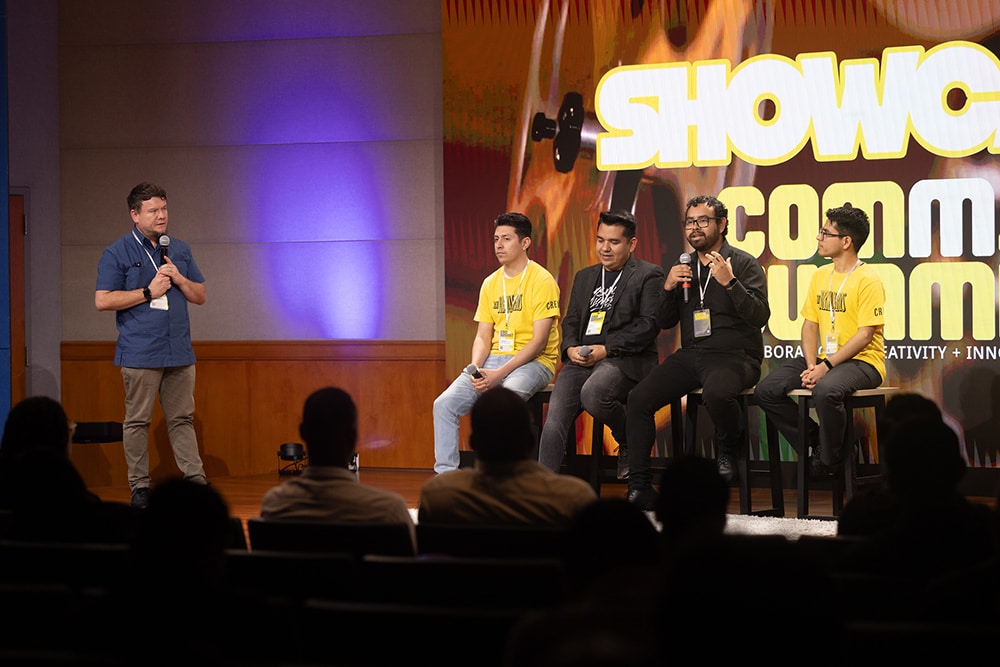
A Personal Story
Adrian Duré, a producer and cinematographer at Hope Media Europe in Germany, followed Costa’s presentation and shared a part of his life story.
Duré focused his talk on sharing how he learned to manage and live with life’s risks and changes along the way. “Fear of the unknown has been part of my life realities,” he said while sitting with his back to the audience and displaying some old photos and videos of his childhood on a big screen. “I had a happy childhood, but full of fears. I was a fearful child,” Duré said. “But between that child and my reality now, I can say that I don’t fear problems or challenges as I used to because by God’s grace, I have been healed from fear.”
Duré shared how he decided to leave his native Argentina in 2008 to face the unknown. “It is a strange sensation to leave one’s country,” he said, sharing how he moved to Germany to start a new life with his German wife.
Duré spoke of how he had to adapt to living in a different culture, in this case marked by order, organization, coordination, punctuality, and set structures. “It was very difficult, because as Hispanics, we thrive on chaos,” he quipped. “But at the same time, Germans took the risk of embracing someone from Latin America to work with them.”
He explained that when facing the unknown, human beings must choose between staying in their comfort zone, hiding, or running away. Another option, Duré added, is developing a plan, taking risks, and being ready to react when the unexpected arises. He shared that in his case, those unexpected turns included panic attacks and a diagnosed anxiety disorder. More than a decade later, Duré is supporting the development of a GC initiative to support people who also struggle with mental health challenges. “It was not easy, but God allowed me to work on a story based on my personal life story,” he said.
In summarizing, Duré called on Adventist communicators to be willing to move toward the unknown and accept the risks. “Sometimes, for an administrator, this is not easy to say, but I have witnessed miracles and met administrations that have said, ‘We will accept the risks involved [in this particular project] and will move forward by faith,’” Duré said.
Finally, he called on those present to trust in a God who gives us precious promises, in one’s creativity, and in one’s enthusiasm and to accept the results. “Behind changes, risks, and the unknown, there is growth,” Duré said, both personal and corporative. “Healing is possible.”
Day one of CommSummit also featured spaces for short talks on creating stories in trans-media storytelling, how dreams take you out of your comfort zone, recognizing what God has given us instead of what we do not have, using parables in cinematography as an evangelism tool, as well as practical ideas and experiences during panel discussions, prayer moments, interactive activities and more. Leaders also highlighted recent television productions on Hope Channel Inter-America and a new film called “Los Jornaleros.”
The original version of this story was posted on the Inter-American Division news site.